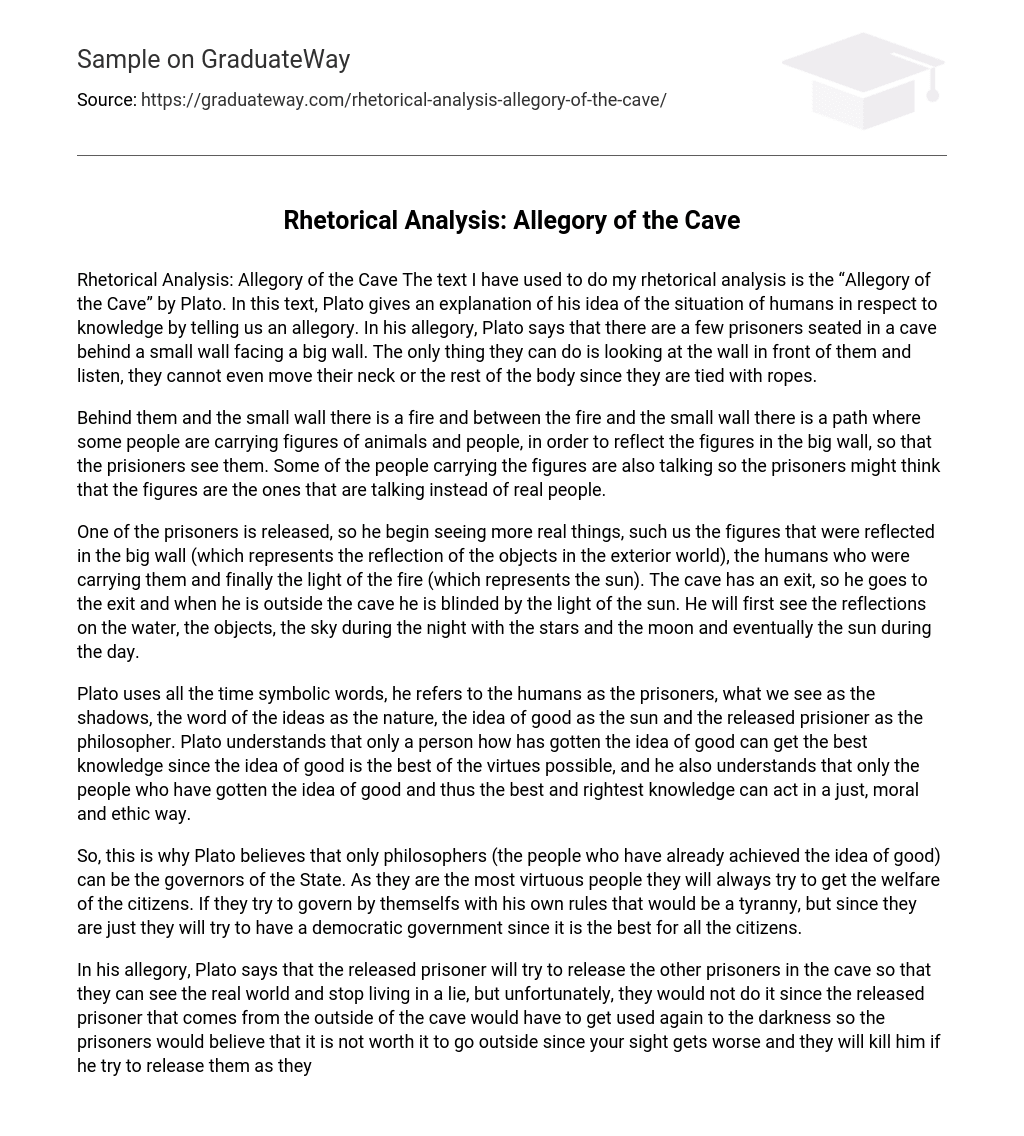Plato’s “Allegory of the Cave” is the text I chose for my rhetorical analysis. In this allegory, Plato uses it to illustrate his idea about the human condition and knowledge. According to him, there are prisoners in a cave who are restricted by ropes and can only look at a wall in front of them while listening.
Behind the small wall, there is a fire. Between the fire and the small wall, there is a path where individuals transport figures of people and animals. Their purpose is to project the figures onto the large wall, so that the prisoners can observe them. Additionally, some of the individuals transporting the figures engage in conversation, potentially causing the prisoners to believe that the figures themselves are speaking rather than actual people.
One prisoner is released and begins to perceive more tangible things, like the figures reflected on the large wall, symbolic of the objects in the outside world, as well as the people who carried them. Eventually, the prisoner also sees the light of the fire, representing the sun. The cave has an exit, so he goes towards it, but once outside, he becomes overwhelmed by the brightness of the sun. Gradually, he starts to observe reflections on water surfaces, various objects, and the sky at night with its stars and moon. Eventually, he is able to see the sun during the day.
Plato consistently uses symbolic language in his writings. He compares humans to prisoners who can only see shadows and refers to the realm of ideas as nature. Plato equates the concept of good to the sun and describes a liberated prisoner as a philosopher. He acknowledges that true knowledge can only be obtained by individuals who understand the idea of good, which represents the highest level of virtue. Additionally, he recognizes that only those with this understanding are able to act justly, morally, and ethically.
Plato asserts that only philosophers who have a genuine understanding of the good are fit to lead the State. Their exceptional virtue ensures that they prioritize the well-being of citizens. However, if they were to govern solely based on their own principles, it would result in tyranny. Instead, their commitment to justice drives them towards striving for a democratic government as it is most advantageous for all citizens.
Plato’s allegory depicts a prisoner being freed from a cave and his subsequent attempts to liberate the other prisoners. The goal is to expose them to the true reality and help them escape their false perceptions. However, the other prisoners resist release as they believe that the returning prisoner would struggle with readjustment to darkness once again. Consequently, they conclude that it is not worth venturing outside since their vision would deteriorate. Inevitably, they reject the idea of liberation and ultimately kill him, similar to how Socrates was met with opposition when he aimed at enlightening people through his ideas.
According to Plato, understanding the concept of good is crucial. This is represented by the prisoner in the cave who sees the sun and realizes that what they previously observed was false. They now perceive the truth, which is the real world outside of the cave where they understand that the shadows were not real. Philosophers, who have the potential to become governors of the State, strive to help others comprehend this idea of good. The goal is for everyone to live in an optimal and just manner.
Plato, a philosopher from over two thousand years ago, had significantly different ideas about the world and humanity compared to current beliefs. Comprehending his highly abstract thoughts can be challenging initially. He considers objects unreal and asserts that ideas are the true reality, which may seem perplexing since we perceive the tangible world as most real based on our senses.
Furthermore, I believe that Plato’s philosophy is an ideal society because it is impossible for a ruler to consistently possess the highest level of virtue and justice. Due to our inherent flaws as humans, we are unable to attain perfection, resulting in imperfect actions. Despite our efforts to act in the best possible way, various obstacles like opposing political parties prevent the government from enacting morally upright policies.





